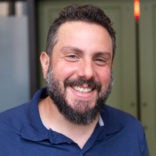Hillel is usually a happy, vibrant space. Now we need to help students process their grief.
Published May 6, 2020
NEW YORK (JTA) — Never in a million years did I ever consider that my work would look like it does today.
When the COVID-19 pandemic hit, our vibrant Jewish community on campus transitioned to a virtual Hillel. We moved our cohort-based learning programs online and increased our presence on Instagram. We added virtual yoga, pre-Pesach cleaning, virtual programs for Yom Hashoah and Yom Ha’atzmaut.
Hunter Hillel staff, where I serve as senior Jewish educator and campus rabbi, reached out to dozens of students each day. What we quickly realized was that the most engaging programming in the world wouldn’t match up to the grief that students were feeling.
Death has become a routine part of Hillel students’ young lives. On campus, we would see them, talk to them and know what they were experiencing day to day. Now, in order to be sure we are there for our students, we text, email and call them daily. Too often they share that they’ve lost a loved one to coronavirus — but that us reaching out to them means so much.
To date, New York City has had over 162,000 confirmed cases of COVID-19. Over 12,000 have died. This is the new reality of New York City. We are the part of the United States hardest hit by the virus, and for Hunter Hillel students, the implications of COVID-19 are heartbreakingly personal.
We heard this week from a dedicated and brilliant former student. She was Hunter Hillel president and she crushed it. She graduated last May, and we took our picture together outside Madison Square Garden — she in her gown and adorned cap, me in my Hunter Hillel T-shirt.
She got her degree and moved on with her adult life.
She checked in not to let us know about a new job or acceptance to medical school; not to tell us she was getting married. No, she wrote because all four of her grandparents have been sick with COVID-19, and one just died.
The family has no idea how they are going to be able to pay for the funeral, and asked if we could help them defray the costs.
For many of our students, we are the conduit to a network of agencies that can assist them in their time of need. We are constantly collecting resources and pushing information out to our students. We directed her to the Hebrew Free Burial Association.
For all of us, “alone” has new meaning now. Imagine how alone you might feel if you were 19 and three of your grandparents died last week.
Our existing training and programs haven’t equipped us to support this need, so we are educating ourselves about how to work with young adults who are bereaved. Last summer we enhanced our caring work through inclusivity training. This summer our training will be centered around grief counseling.
So many of our students have suffered loss in the same way at the same time, but they are not the same people. Some will want to mark their losses as a community and mourn together, while others’ needs will be more subtle and individual.
We must be prepared to meet each student where they are by continuing our near-constant individual student outreach and by deepening our commitment to relationship-centered events and educational programs. And we must accomplish this without losing the celebration that is the unique life-cycle moment of college: by providing the space and opportunity (virtual or physical) for our young adults to hang out, share music, play games.
Last week, I returned to campus; it was desolate. Empty halls and classrooms, escalators still running but with no people to move. Is this what it will look like next year?
At this point, there is no way to know. What we do know is that whether in-person or virtually, this fall we will welcome thousands of students who are suffering immensely. They will be grieving lost family, lost jobs and a lost sense of a clear future.
Our first responsibility is to meet them, talk to them, discern their physical and mental health needs and do everything we can to fulfill them. In this moment, that means ramping up grief training for those working with young adults — something that would not have been a top priority in the past but absolutely must be in the future.
This piece is a part of our series of Visions for the Post-Pandemic Jewish Future — click here to read the other stories in this series. Use #JewishFuture to share your own ideas on social media. If you’d like to submit an essay for consideration, email [email protected] with “Visions Project Submission” in the subject line.

is Senior Jewish Educator and Campus Rabbi at Hunter College Hillel.















